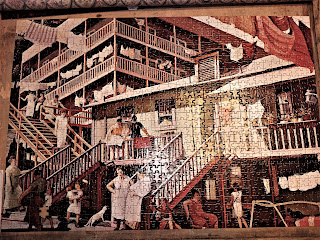Business: How have you changed the way you promote and support your work, and generally go about the business of being an author, since “Lockdown Life” began a year ago? Anything you’ve learned that will remain in place as we move forward?
Abir here.
So earlier this week Piers Morgan resigned. You know Piers Morgan – loud-mouthed, opinionated, British journalist cum rent-a-gob who got sacked from his job as editor of a newspaper for printing fake photos, and sacked from CNN for nobody watching his show. Well he resigned this week from a British breakfast TV show (shortly before his bosses were probably going to sack him). Anyway, the reason I bring up dear Piers is because his Twitter profile reads:
‘One day you're cock of the walk, the next a feather duster’
Those aren’t Piers’ own words but a quote from Margot Barber, but they do sum up how I feel about this week’s question.
My last novel came out in November 2019. My publishers, god bless ‘em, had pulled out all the stops: lunch at a fancy London restaurant for the distinguished members of the press, radio and newspaper interviews, and a national book tour (seven cities in eight days with a trip to Milan in the middle to launch the Italian version of an earlier book). It seemed as though my career was going places!
And then, a few short months later, lockdown hit and the world went into hibernation. Now I should point out, that I and my family have been extremely lucky. None of us have caught covid, not even my mum who insisted on flying back from India two days before all flights were banned. In hindsight it was probably the right decision, but her rationale for taking the risk: ‘I’m Indian. We have so many diseases there that I have natural immunity,’ just sounded bonkers.
But I digress. While the family has been fine, the writing and all things related to it, have suffered. For the first month of lockdown, I didn’t manage to write a word, and it wasn’t until mid-April that I got back into some sort of a routine. Even then, the writing process was slower, more hap-hazard and more bitty. But what really suffered was the marketing side of things.
I’m one of those writers who finds the writing less fun than the meeting people at festivals. I love everything about them, from the panels to the pub crawls. I tend to draw energy from them, and in turn, they’ve been a great avenue for me to meet new readers around the world.
And then all that stopped. Instead of Barcelona, I was consigned to my basement. Instead of Atlanta, I was stuck writing in my attic. That came as a huge blow, and while a number of events went online and we could reach newer audiences in ever more exotic time zones, it has never felt quite the same to me.
What’s more, lockdown has played havoc with the publishing schedules. The paperback of my fourth book, which was launched with such fanfare in November 2019 was pushed back from April 2020 to August and lacked most of the marketing events I was hoping to do. And while I was much luckier than the debut novelists launching their careers in this strange new environment, it still seemed like some of the momentum we’d generated had dissipated.
It’s also affected the timing of the launch of my next book, The Shadows of Men. We were hoping to launch this in the spring of this year. The date was then shifted to July, and then shifted again to November of this year. It feels like the right move, especially if life is returning to some semblance of normality by then, but it’ll have meant I’ll have gone 24 months without launching a new book.
I’m trying to make up for it in other ways. There have been the online festivals of course, but I’ve also done events for corporate entities. And I’ve recently hired a team to revamp my social media footprint (their words, not mine. I don’t really know what this means, but they are millennials and I am old, so I am deferring to their younger judgement). I should have a new website by next month, and I shall be issuing my newsletter more regularly than once in two years. They have also tried to explain to me the purpose and benefits of having an Instagram account but as far as I can tell, it’s basically just pictures of cats and peoples’ dinners.
So there you have it. Pre lockdown, I was going places. I had class. I could have been a contender. And then, bang, crash, wallop, all the fun things that helped me build a career – such as compromising journalists with alcohol, and ramming my opinions down the throats of a room full of people at festivals, went out the window. I have become the proverbial feather duster.
But I’m not too down-hearted. I believe we’re going to get through this and rebound stronger. And when that happens, I’ll have my trusty team of tech-savy, twenty-somethings to tell me exactly which pictures to post on Instagram to guarantee my next book is a best-seller!
That might sound like a naïve strategy, but if there’s one thing I’ve learned, it’s that sometimes, even the strangest of notions can prove to be correct. Remember my mum’s justification for why covid wouldn’t touch her? Well it turns out that real scientists think she might have been right. (I hate it when that happens).
https://www.bbc.co.uk/news/world-asia-india-54730290
Thank you for reading, and wishing you all a safe and peaceful weekend.
PS. Just over a week ago, we lost Paul. I never knew him, other than through his writing and this blog, but from what I’ve read and heard from the others, he must have been a wonderful man. His passing is a loss to all of us.



























